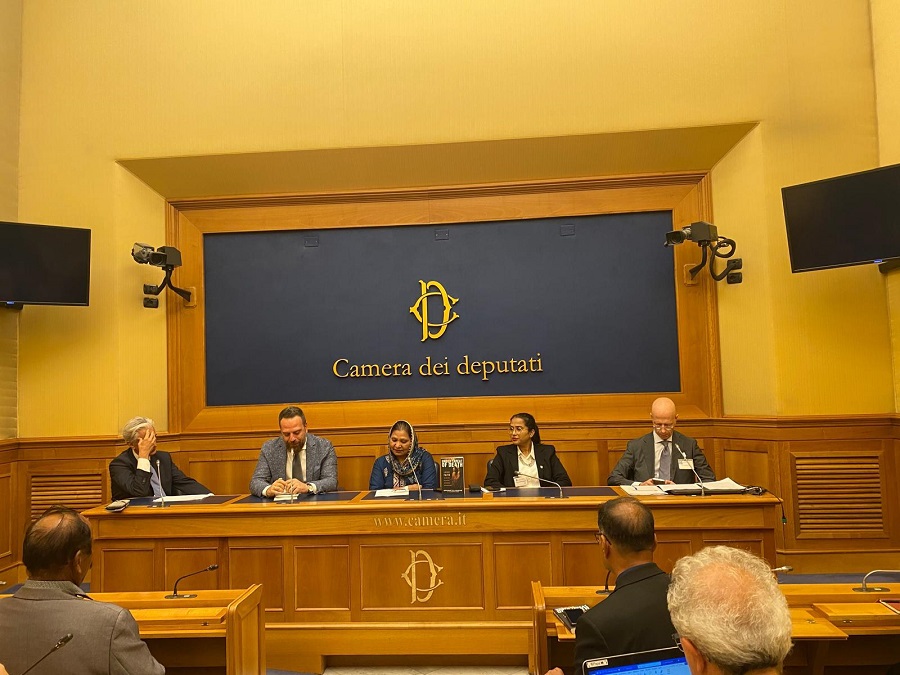ROME, Italy: In a significant press conference organized by the Association of Pakistani Christians in Italy in collaboration with the Jubilee Campaign, Netherlands, panelists called upon the international community, European Parliamentarians, particularly Italian legislators, to employ diplomatic channels and advocate for legislative reforms to address the persecution of the Christian community caused by the misuse of blasphemy laws and forced faith conversions in Pakistan.
At this juncture, a new book by Shagufta Kausar and Eugene Bach, Under Threat of Death: A Mother’s Faith in the Face of Injustice, Imprisonment, and Persecution, published by Whitaker House, was launched.
The book recounts Kausar’s harrowing experiences as a Christian facing a blasphemy accusation in Pakistan.
Speaking at the event, Shagufta Kausar revealed that she was offered multiple times to adopt Islam to avoid punishment. However, she refused to abandon her faith in Christianity even under the threat of death.
“Christians in Pakistan are like sheep among wolves without a protector,” she stated. Kausar also expressed her gratitude to Lorenzo Malagola and Professor Shahid Mobeen for organizing the press conference, allowing her to share her testimony of eight years in prison because of her faith.
Lorenzo Malagola emphasized the importance of freedom of religion as a core human rights value recognized and promoted both within and outside the EU. He urged the Pakistani government to ensure that all religious minorities can practice their beliefs without fear or restriction.
Malagola regretted that the National Database and Registration Authority (NADRA)’s policy regarding the change of religion in national identity cards is discriminatory, restricting Muslim citizens’ religious conversion away from Islam. This policy undermines the freedom of religion, expression, and identity. He stressed that the human rights abuses in Pakistan are deeply alarming and require urgent attention and action.
Fr. Gilbert Shahzad urged Italian parliamentarians and EU Member States to engage politically with Pakistan to abolish the death penalty and fulfill human rights obligations. He emphasized that the government of Pakistan must prioritize the protection of its religious minorities by passing progressive laws and creating an environment where all citizens can exercise their rights and freedoms without fear.
Shahzad highlighted that Pakistan received 12 recommendations regarding repealing or amending blasphemy laws during its 4th cycle of the Universal Periodic Review (UPR) in January 2023, but has failed to implement them effectively.
Joseph Jansen, a human rights activist with Jubilee Campaign, the Netherlands , addressed the various forms of persecution that Christians in Pakistan continue to face. These abuses include the misuse of blasphemy laws, mob lynching, attacks on churches and Christian homes, honor killings, the abduction and rape of minor girls followed by their forcible conversion to Islam, and the widespread practice of bonded labor at brick kilns.
Jansen appealed to the Pakistani authorities to strengthen their efforts in upholding laws meant to protect minority rights, emphasizing the importance of commitment from the judiciary, state government, and police in ensuring justice. He noted that the situation of religious persecution and human rights violations has been deteriorating, despite the European Parliament’s 2021 resolution urging Pakistan to repeal blasphemy laws and criminalize forced faith conversions.
Recent violent incidents underscore the urgent need for accountability and safeguards to protect religious minorities. Jansen pointed to the tragic mob attack in Sargodha in May 2024, resulting in the death of Nazir Masih, and the mob violence in Jaranwala in August 2023, which led to the destruction of 26 churches and 90 Christian homes.
Tabassum Yousaf, an advocate, urged the Pakistani government to combat violence against women, including domestic violence, forced marriage, and child marriage. She highlighted the gross abuse of Pakistan’s blasphemy laws, where false complaints are often registered against innocent individuals to settle personal scores, fostering a climate of religiously motivated violence and persecution in several parts of the country.
Pastor Justin Bhatti noted that UN treaty bodies monitoring the implementation of the Covenant on Civil and Political Rights (CCPR), Convention on the Elimination of Racial Discrimination (CERD), and Convention on the Rights of the Child (CRC) have urged Pakistan to repeal all blasphemy laws or amend them in compliance with international human rights standards.
Bhatti added that the misuse of blasphemy laws instills terror and fear among vulnerable groups and must be effectively addressed.
Massimiliano Tubani, Director of ACN-Italy, underscored the need to safeguard religious minorities and enhance socioeconomic development efforts. Tubani emphasized that protecting the rights of religious minorities is essential for ensuring their safety and dignity.
Speakers called on Pakistani authorities to address grave human rights violations, prioritize socioeconomic upliftment, and ensure the protection of all citizens, regardless of their faith. They emphasized the need for Pakistan to meet its international commitments by upholding human rights and adhering to international treaties to ensure justice for everyone.
The press conference highlighted the broad, vague, and coercive nature of Pakistan’s blasphemy laws, which carry a mandatory death penalty.
The speakers called for the abolition of the death penalty and the release of individuals imprisoned for peacefully exercising their faith.
They also urged the Pakistani government to respect, fulfill, and promote women’s rights and enact laws to criminalize forced faith conversions of minority girls and women.
